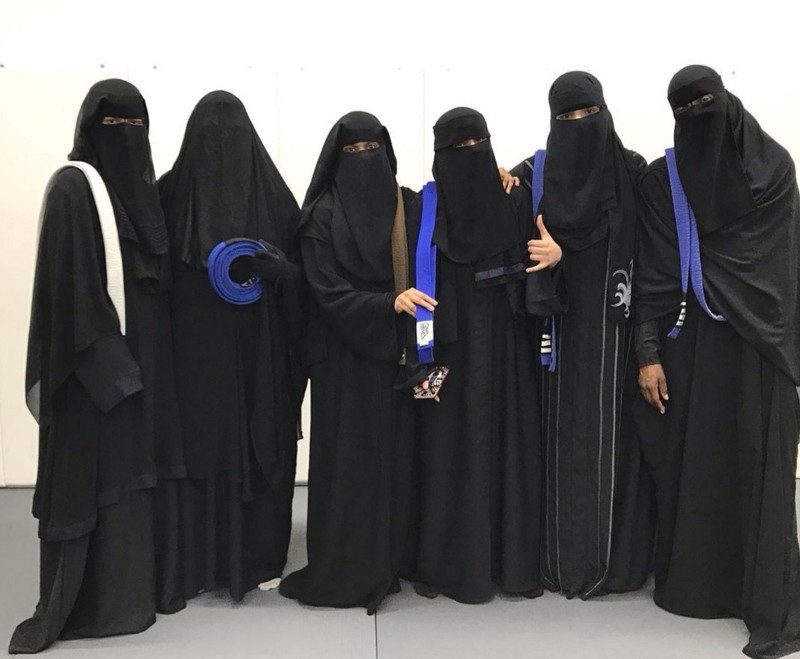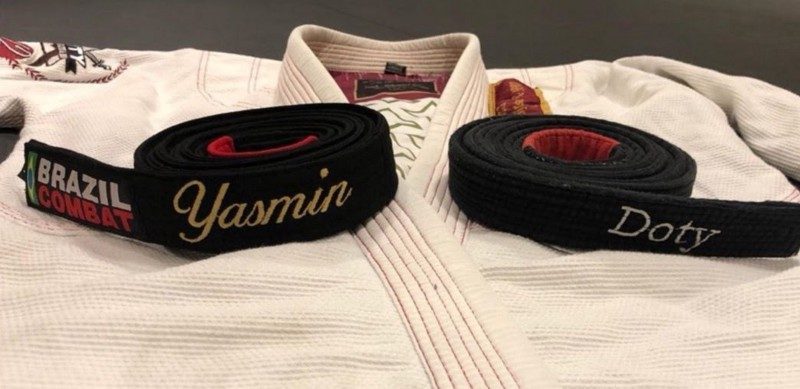by Sahar ElKabbash

Qatar Mixed Martial Arts (QMMA) was founded in 2010 by coach Mohammed Doty. It all began when the coach started teaching some techniques to his son in the backyard of their house. Neighbours started getting interested and let their kids train with them. The backyard turned into a dojo in a room and the room turned into one of the most important MMA training facilities in Qatar whose students compete all over the world.
The women’s program was established in 2012 by his wife, coach Yasmin Koya who became the first Indian niqabi (a woman who chooses to cover her face with a veil) with a black belt in the world. Initially, it was a combined class for female adults and children, but as the number of students increased, she had to create separate classes for each. The classes kept growing and now the majority of the women who train with her either wear the full face veil — the niqab, or cover their hair with a hijab.
Yasmin says: “My main goal was to provide a space for covered women to train without compromising their hijab. When you’re a covered woman, people don’t really think you’re capable of such things. And In all clubs, the boys’ program would always be so much better than the girls’. I wanted my girls to learn how to defend themselves.”

Yasmin’s journey started when she got introduced to Ultimate Fighting Championship (UFC) and fell in love with martial arts, especially jiu-jitsu. Her husband started teaching her what he learnt in class every day. She was blown away at how she was able to practice a move on him then see his face turn red from the chokes. It wasn’t until she received her blue belt that she officially started the women’s program in QMMA.
“It felt like something I could do. When I saw someone get choked-out with a technique, I noticed it didn’t depend on the person’s strength as much as the technique itself,” adds Yasmin.
“It’s also extra empowering when you’re a small person and don’t need to rely on your power to finish someone.”
Furthermore, the women’s program caters to the conservative section of society. Her students who cover from head to toe and have families who aren’t comfortable with them leaving the house too often can find a safe, contained space for themselves to train, compete, and learn to defend themselves and their children.
Yasmin organizes competitions for girls and women who play jiu-jitsu in Qatar that are open to the public. She also holds competitions open to female spectators only so that hijabis and niqabis and other women who mind fighting in front of a male audience can experience competing without needing to cover up or worrying who’s watching.
“What most of the world doesn’t realize is that just because we are behind a veil doesn’t mean we don’t exist. There is more to us than what your eyes see.”
After the lockdown, like all gyms, QMMA had to stop all classes for the safety of their coaches and students. Inspired by the occasional techniques videos they see on Instagram, coaches Yasmin and Mohammed decided to take it to the next level and resume their classes online. They wanted their students to stay active and keep themselves busy during the lockdown. They showed them how to create practice dummies out of their gis and pillows so they can have an inanimate training partner.
The coaches never stopped practising, teaching online and training their children at home which earned them both promotions making coach Yasmin the first niqabi black belt jiu-jitsu fighter.
Story edited to include corrections.






